People Management in Healthcare: An NHS Case Study Analysis
VerifiedAdded on 2020/12/10
|11
|2825
|409
Report
AI Summary
This report presents a case study analysis of people management within the National Health Service (NHS), addressing challenges such as staff shortages and employee retention. The report examines key theoretical models like the Contingency Theory and the Expectancy Theory and their applications to leadership, training and development, and talent management within the NHS. It outlines the roles and priorities of NHS management, including recruitment, training, and compensation. The report identifies internal and external influences affecting leadership, training, and talent management, such as employee support and social factors. Recommendations include adopting contingency leadership, implementing the Instructional System Development Model, and strategic talent acquisition. The report concludes by emphasizing the importance of proactive people management strategies for the NHS to overcome its staffing challenges and improve overall performance.
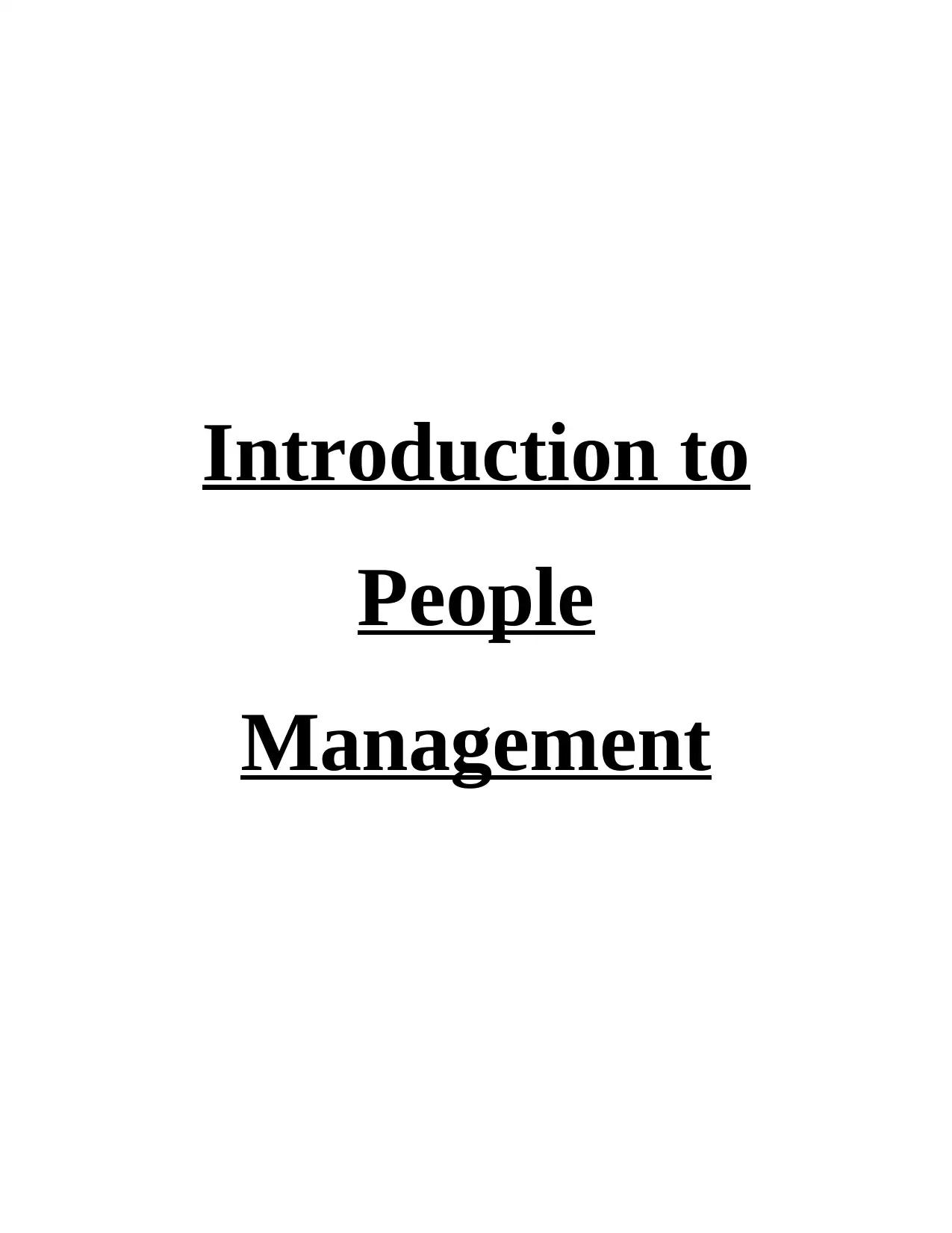
Introduction to
People
Management
People
Management
Paraphrase This Document
Need a fresh take? Get an instant paraphrase of this document with our AI Paraphraser
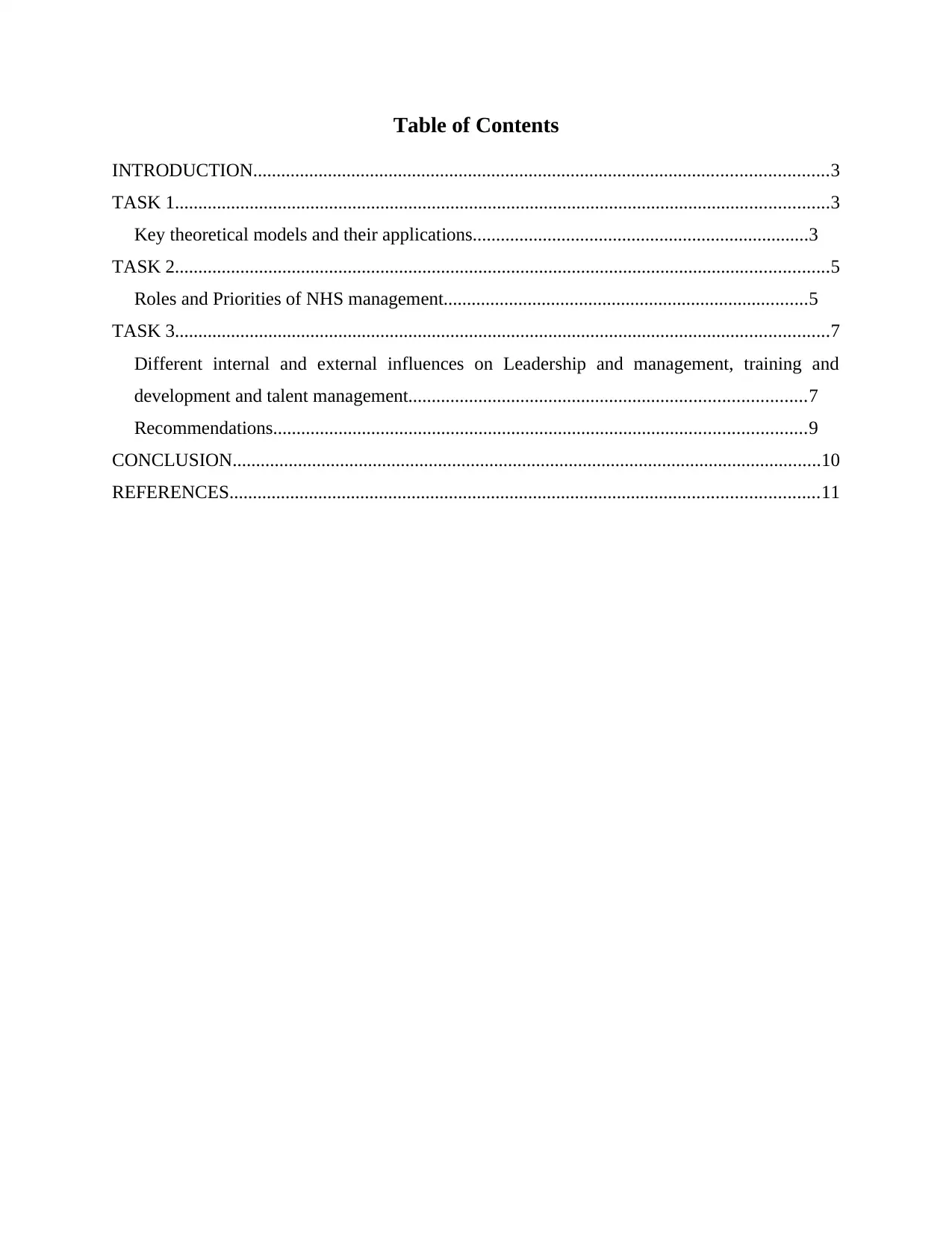
Table of Contents
INTRODUCTION...........................................................................................................................3
TASK 1............................................................................................................................................3
Key theoretical models and their applications........................................................................3
TASK 2............................................................................................................................................5
Roles and Priorities of NHS management..............................................................................5
TASK 3............................................................................................................................................7
Different internal and external influences on Leadership and management, training and
development and talent management.....................................................................................7
Recommendations..................................................................................................................9
CONCLUSION..............................................................................................................................10
REFERENCES..............................................................................................................................11
INTRODUCTION...........................................................................................................................3
TASK 1............................................................................................................................................3
Key theoretical models and their applications........................................................................3
TASK 2............................................................................................................................................5
Roles and Priorities of NHS management..............................................................................5
TASK 3............................................................................................................................................7
Different internal and external influences on Leadership and management, training and
development and talent management.....................................................................................7
Recommendations..................................................................................................................9
CONCLUSION..............................................................................................................................10
REFERENCES..............................................................................................................................11
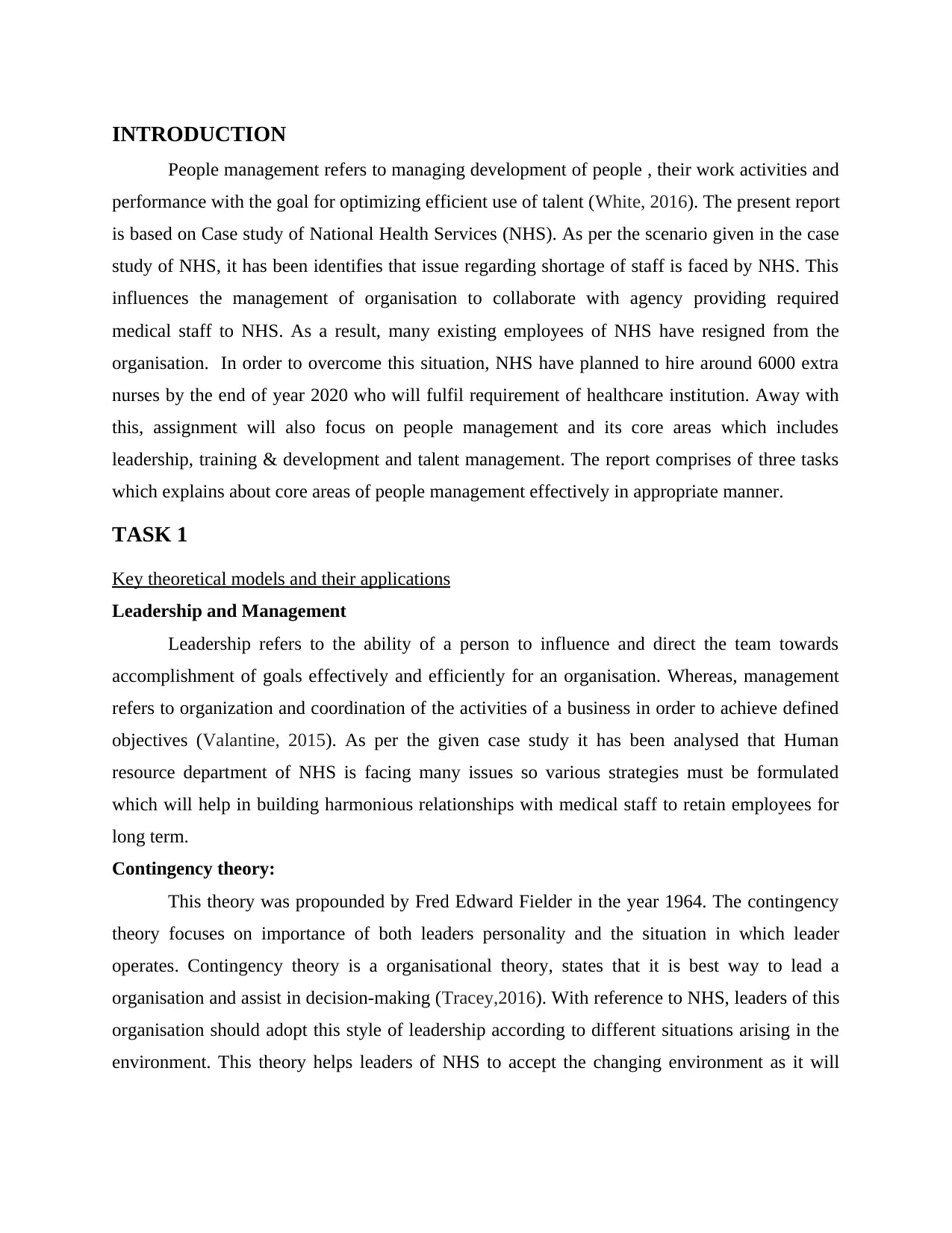
INTRODUCTION
People management refers to managing development of people , their work activities and
performance with the goal for optimizing efficient use of talent (White, 2016). The present report
is based on Case study of National Health Services (NHS). As per the scenario given in the case
study of NHS, it has been identifies that issue regarding shortage of staff is faced by NHS. This
influences the management of organisation to collaborate with agency providing required
medical staff to NHS. As a result, many existing employees of NHS have resigned from the
organisation. In order to overcome this situation, NHS have planned to hire around 6000 extra
nurses by the end of year 2020 who will fulfil requirement of healthcare institution. Away with
this, assignment will also focus on people management and its core areas which includes
leadership, training & development and talent management. The report comprises of three tasks
which explains about core areas of people management effectively in appropriate manner.
TASK 1
Key theoretical models and their applications
Leadership and Management
Leadership refers to the ability of a person to influence and direct the team towards
accomplishment of goals effectively and efficiently for an organisation. Whereas, management
refers to organization and coordination of the activities of a business in order to achieve defined
objectives (Valantine, 2015). As per the given case study it has been analysed that Human
resource department of NHS is facing many issues so various strategies must be formulated
which will help in building harmonious relationships with medical staff to retain employees for
long term.
Contingency theory:
This theory was propounded by Fred Edward Fielder in the year 1964. The contingency
theory focuses on importance of both leaders personality and the situation in which leader
operates. Contingency theory is a organisational theory, states that it is best way to lead a
organisation and assist in decision-making (Tracey,2016). With reference to NHS, leaders of this
organisation should adopt this style of leadership according to different situations arising in the
environment. This theory helps leaders of NHS to accept the changing environment as it will
People management refers to managing development of people , their work activities and
performance with the goal for optimizing efficient use of talent (White, 2016). The present report
is based on Case study of National Health Services (NHS). As per the scenario given in the case
study of NHS, it has been identifies that issue regarding shortage of staff is faced by NHS. This
influences the management of organisation to collaborate with agency providing required
medical staff to NHS. As a result, many existing employees of NHS have resigned from the
organisation. In order to overcome this situation, NHS have planned to hire around 6000 extra
nurses by the end of year 2020 who will fulfil requirement of healthcare institution. Away with
this, assignment will also focus on people management and its core areas which includes
leadership, training & development and talent management. The report comprises of three tasks
which explains about core areas of people management effectively in appropriate manner.
TASK 1
Key theoretical models and their applications
Leadership and Management
Leadership refers to the ability of a person to influence and direct the team towards
accomplishment of goals effectively and efficiently for an organisation. Whereas, management
refers to organization and coordination of the activities of a business in order to achieve defined
objectives (Valantine, 2015). As per the given case study it has been analysed that Human
resource department of NHS is facing many issues so various strategies must be formulated
which will help in building harmonious relationships with medical staff to retain employees for
long term.
Contingency theory:
This theory was propounded by Fred Edward Fielder in the year 1964. The contingency
theory focuses on importance of both leaders personality and the situation in which leader
operates. Contingency theory is a organisational theory, states that it is best way to lead a
organisation and assist in decision-making (Tracey,2016). With reference to NHS, leaders of this
organisation should adopt this style of leadership according to different situations arising in the
environment. This theory helps leaders of NHS to accept the changing environment as it will
⊘ This is a preview!⊘
Do you want full access?
Subscribe today to unlock all pages.

Trusted by 1+ million students worldwide
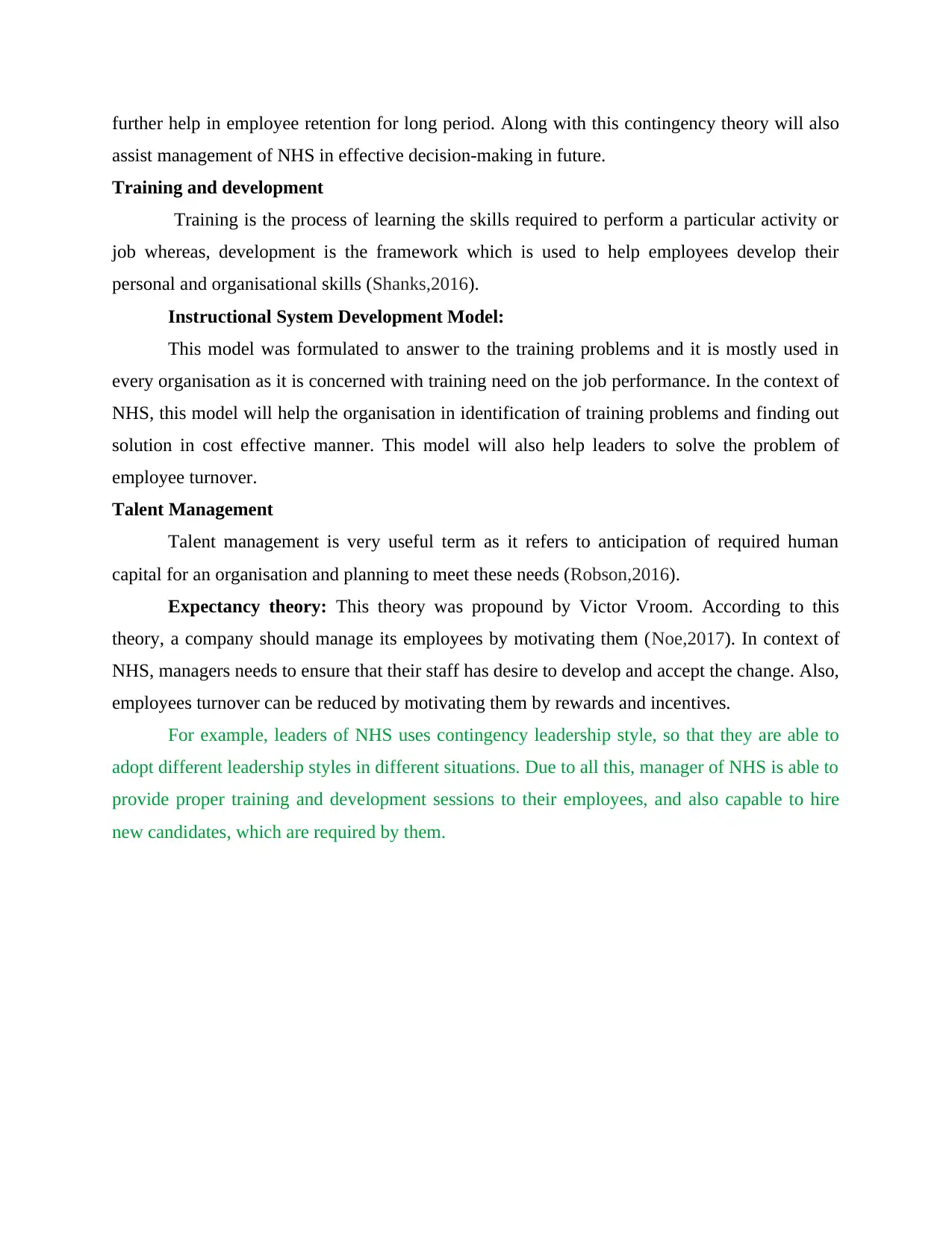
further help in employee retention for long period. Along with this contingency theory will also
assist management of NHS in effective decision-making in future.
Training and development
Training is the process of learning the skills required to perform a particular activity or
job whereas, development is the framework which is used to help employees develop their
personal and organisational skills (Shanks,2016).
Instructional System Development Model:
This model was formulated to answer to the training problems and it is mostly used in
every organisation as it is concerned with training need on the job performance. In the context of
NHS, this model will help the organisation in identification of training problems and finding out
solution in cost effective manner. This model will also help leaders to solve the problem of
employee turnover.
Talent Management
Talent management is very useful term as it refers to anticipation of required human
capital for an organisation and planning to meet these needs (Robson,2016).
Expectancy theory: This theory was propound by Victor Vroom. According to this
theory, a company should manage its employees by motivating them (Noe,2017). In context of
NHS, managers needs to ensure that their staff has desire to develop and accept the change. Also,
employees turnover can be reduced by motivating them by rewards and incentives.
For example, leaders of NHS uses contingency leadership style, so that they are able to
adopt different leadership styles in different situations. Due to all this, manager of NHS is able to
provide proper training and development sessions to their employees, and also capable to hire
new candidates, which are required by them.
assist management of NHS in effective decision-making in future.
Training and development
Training is the process of learning the skills required to perform a particular activity or
job whereas, development is the framework which is used to help employees develop their
personal and organisational skills (Shanks,2016).
Instructional System Development Model:
This model was formulated to answer to the training problems and it is mostly used in
every organisation as it is concerned with training need on the job performance. In the context of
NHS, this model will help the organisation in identification of training problems and finding out
solution in cost effective manner. This model will also help leaders to solve the problem of
employee turnover.
Talent Management
Talent management is very useful term as it refers to anticipation of required human
capital for an organisation and planning to meet these needs (Robson,2016).
Expectancy theory: This theory was propound by Victor Vroom. According to this
theory, a company should manage its employees by motivating them (Noe,2017). In context of
NHS, managers needs to ensure that their staff has desire to develop and accept the change. Also,
employees turnover can be reduced by motivating them by rewards and incentives.
For example, leaders of NHS uses contingency leadership style, so that they are able to
adopt different leadership styles in different situations. Due to all this, manager of NHS is able to
provide proper training and development sessions to their employees, and also capable to hire
new candidates, which are required by them.
Paraphrase This Document
Need a fresh take? Get an instant paraphrase of this document with our AI Paraphraser
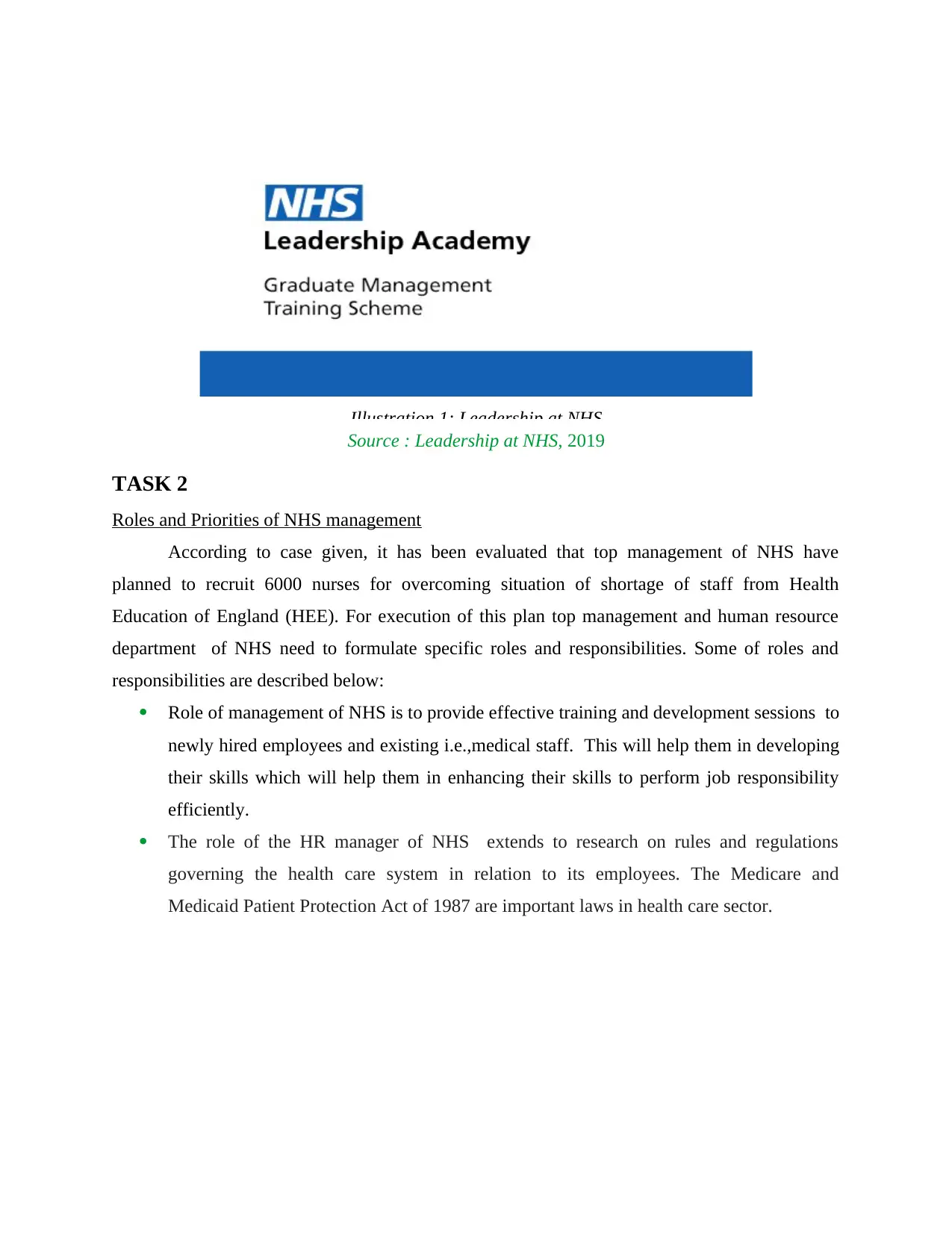
Source : Leadership at NHS, 2019
TASK 2
Roles and Priorities of NHS management
According to case given, it has been evaluated that top management of NHS have
planned to recruit 6000 nurses for overcoming situation of shortage of staff from Health
Education of England (HEE). For execution of this plan top management and human resource
department of NHS need to formulate specific roles and responsibilities. Some of roles and
responsibilities are described below:
Role of management of NHS is to provide effective training and development sessions to
newly hired employees and existing i.e.,medical staff. This will help them in developing
their skills which will help them in enhancing their skills to perform job responsibility
efficiently.
The role of the HR manager of NHS extends to research on rules and regulations
governing the health care system in relation to its employees. The Medicare and
Medicaid Patient Protection Act of 1987 are important laws in health care sector.
Illustration 1: Leadership at NHS
TASK 2
Roles and Priorities of NHS management
According to case given, it has been evaluated that top management of NHS have
planned to recruit 6000 nurses for overcoming situation of shortage of staff from Health
Education of England (HEE). For execution of this plan top management and human resource
department of NHS need to formulate specific roles and responsibilities. Some of roles and
responsibilities are described below:
Role of management of NHS is to provide effective training and development sessions to
newly hired employees and existing i.e.,medical staff. This will help them in developing
their skills which will help them in enhancing their skills to perform job responsibility
efficiently.
The role of the HR manager of NHS extends to research on rules and regulations
governing the health care system in relation to its employees. The Medicare and
Medicaid Patient Protection Act of 1987 are important laws in health care sector.
Illustration 1: Leadership at NHS
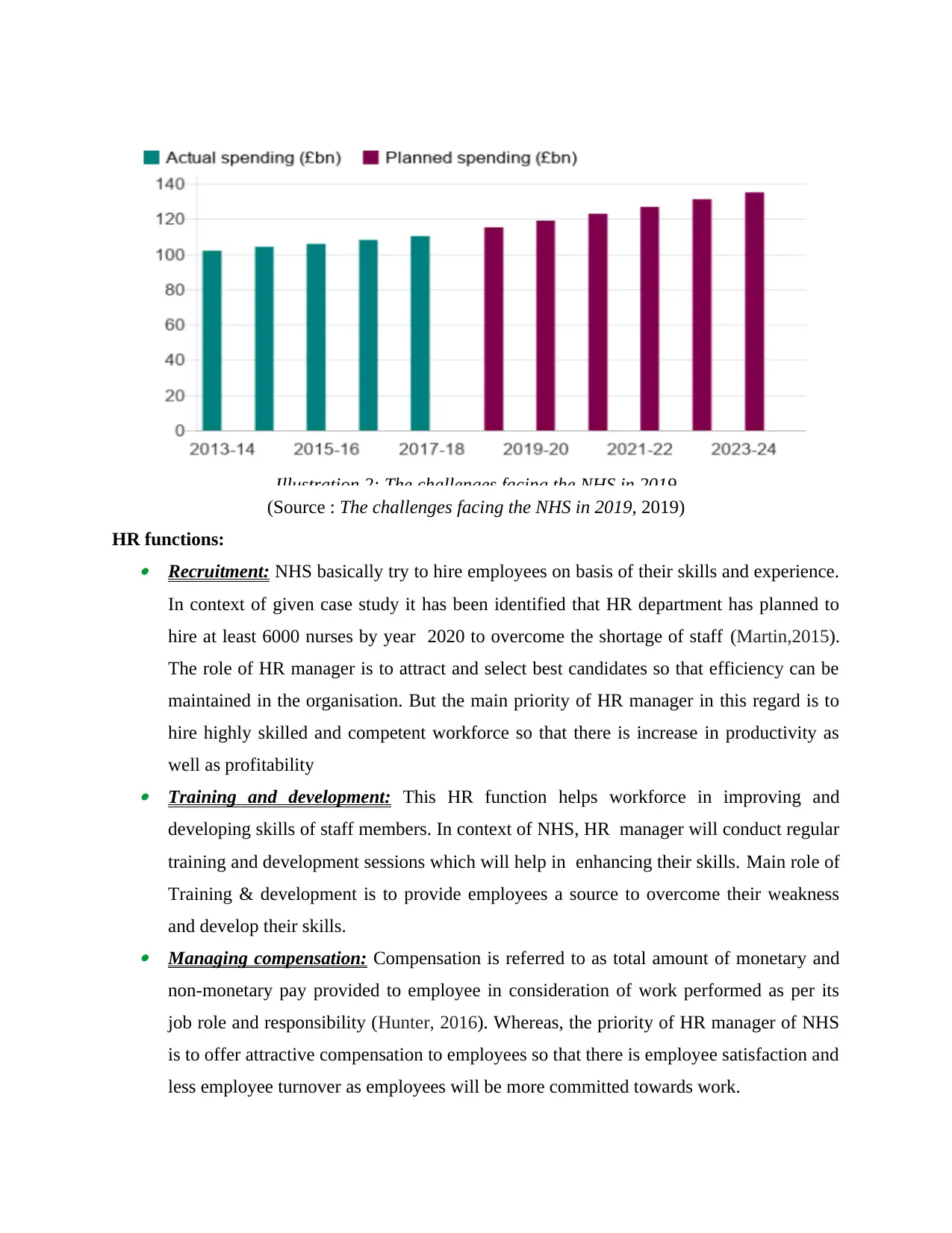
(Source : The challenges facing the NHS in 2019, 2019)
HR functions: Recruitment: NHS basically try to hire employees on basis of their skills and experience.
In context of given case study it has been identified that HR department has planned to
hire at least 6000 nurses by year 2020 to overcome the shortage of staff (Martin,2015).
The role of HR manager is to attract and select best candidates so that efficiency can be
maintained in the organisation. But the main priority of HR manager in this regard is to
hire highly skilled and competent workforce so that there is increase in productivity as
well as profitability Training and development: This HR function helps workforce in improving and
developing skills of staff members. In context of NHS, HR manager will conduct regular
training and development sessions which will help in enhancing their skills. Main role of
Training & development is to provide employees a source to overcome their weakness
and develop their skills. Managing compensation: Compensation is referred to as total amount of monetary and
non-monetary pay provided to employee in consideration of work performed as per its
job role and responsibility (Hunter, 2016). Whereas, the priority of HR manager of NHS
is to offer attractive compensation to employees so that there is employee satisfaction and
less employee turnover as employees will be more committed towards work.
Illustration 2: The challenges facing the NHS in 2019
HR functions: Recruitment: NHS basically try to hire employees on basis of their skills and experience.
In context of given case study it has been identified that HR department has planned to
hire at least 6000 nurses by year 2020 to overcome the shortage of staff (Martin,2015).
The role of HR manager is to attract and select best candidates so that efficiency can be
maintained in the organisation. But the main priority of HR manager in this regard is to
hire highly skilled and competent workforce so that there is increase in productivity as
well as profitability Training and development: This HR function helps workforce in improving and
developing skills of staff members. In context of NHS, HR manager will conduct regular
training and development sessions which will help in enhancing their skills. Main role of
Training & development is to provide employees a source to overcome their weakness
and develop their skills. Managing compensation: Compensation is referred to as total amount of monetary and
non-monetary pay provided to employee in consideration of work performed as per its
job role and responsibility (Hunter, 2016). Whereas, the priority of HR manager of NHS
is to offer attractive compensation to employees so that there is employee satisfaction and
less employee turnover as employees will be more committed towards work.
Illustration 2: The challenges facing the NHS in 2019
⊘ This is a preview!⊘
Do you want full access?
Subscribe today to unlock all pages.

Trusted by 1+ million students worldwide
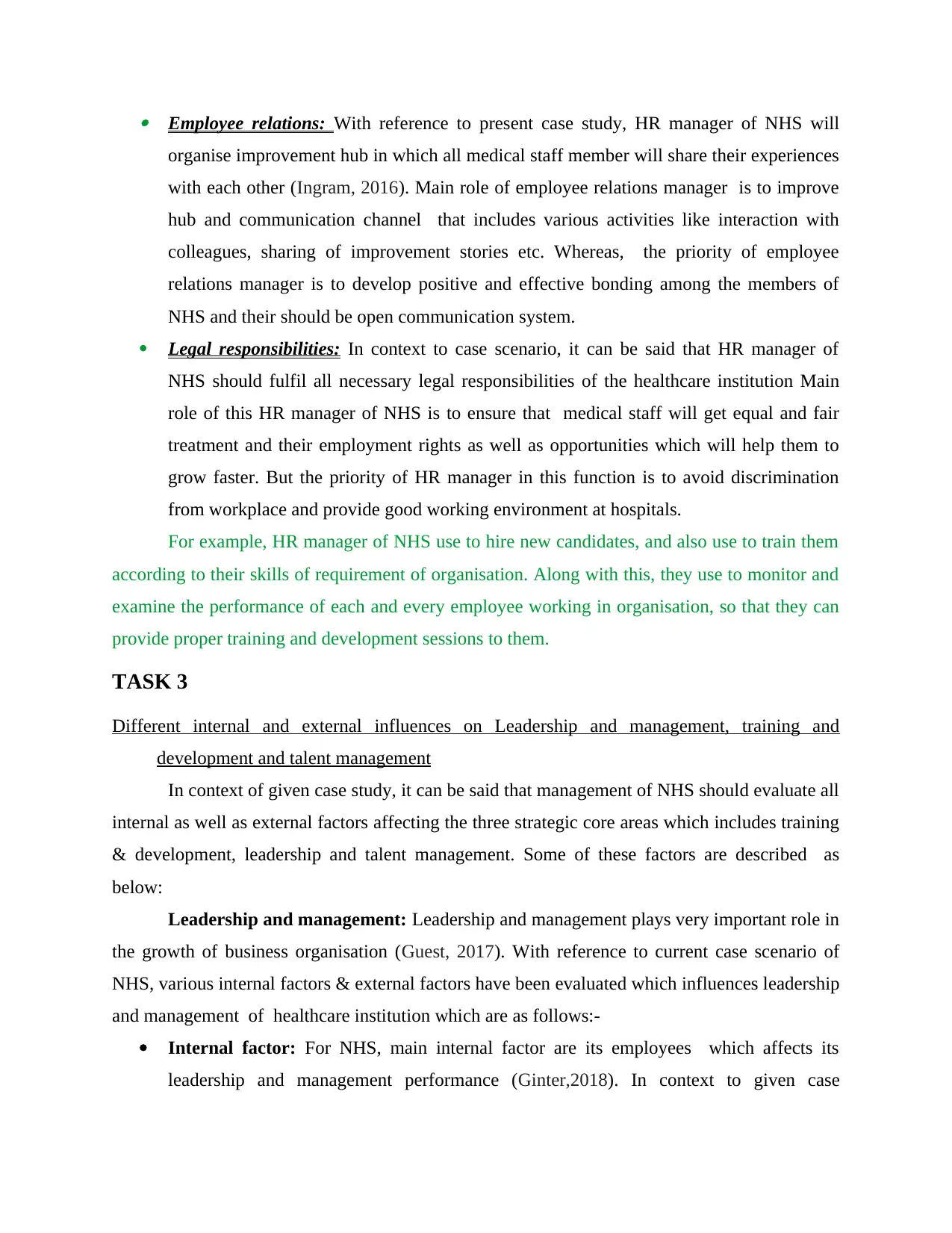
Employee relations: With reference to present case study, HR manager of NHS will
organise improvement hub in which all medical staff member will share their experiences
with each other (Ingram, 2016). Main role of employee relations manager is to improve
hub and communication channel that includes various activities like interaction with
colleagues, sharing of improvement stories etc. Whereas, the priority of employee
relations manager is to develop positive and effective bonding among the members of
NHS and their should be open communication system.
Legal responsibilities: In context to case scenario, it can be said that HR manager of
NHS should fulfil all necessary legal responsibilities of the healthcare institution Main
role of this HR manager of NHS is to ensure that medical staff will get equal and fair
treatment and their employment rights as well as opportunities which will help them to
grow faster. But the priority of HR manager in this function is to avoid discrimination
from workplace and provide good working environment at hospitals.
For example, HR manager of NHS use to hire new candidates, and also use to train them
according to their skills of requirement of organisation. Along with this, they use to monitor and
examine the performance of each and every employee working in organisation, so that they can
provide proper training and development sessions to them.
TASK 3
Different internal and external influences on Leadership and management, training and
development and talent management
In context of given case study, it can be said that management of NHS should evaluate all
internal as well as external factors affecting the three strategic core areas which includes training
& development, leadership and talent management. Some of these factors are described as
below:
Leadership and management: Leadership and management plays very important role in
the growth of business organisation (Guest, 2017). With reference to current case scenario of
NHS, various internal factors & external factors have been evaluated which influences leadership
and management of healthcare institution which are as follows:-
Internal factor: For NHS, main internal factor are its employees which affects its
leadership and management performance (Ginter,2018). In context to given case
organise improvement hub in which all medical staff member will share their experiences
with each other (Ingram, 2016). Main role of employee relations manager is to improve
hub and communication channel that includes various activities like interaction with
colleagues, sharing of improvement stories etc. Whereas, the priority of employee
relations manager is to develop positive and effective bonding among the members of
NHS and their should be open communication system.
Legal responsibilities: In context to case scenario, it can be said that HR manager of
NHS should fulfil all necessary legal responsibilities of the healthcare institution Main
role of this HR manager of NHS is to ensure that medical staff will get equal and fair
treatment and their employment rights as well as opportunities which will help them to
grow faster. But the priority of HR manager in this function is to avoid discrimination
from workplace and provide good working environment at hospitals.
For example, HR manager of NHS use to hire new candidates, and also use to train them
according to their skills of requirement of organisation. Along with this, they use to monitor and
examine the performance of each and every employee working in organisation, so that they can
provide proper training and development sessions to them.
TASK 3
Different internal and external influences on Leadership and management, training and
development and talent management
In context of given case study, it can be said that management of NHS should evaluate all
internal as well as external factors affecting the three strategic core areas which includes training
& development, leadership and talent management. Some of these factors are described as
below:
Leadership and management: Leadership and management plays very important role in
the growth of business organisation (Guest, 2017). With reference to current case scenario of
NHS, various internal factors & external factors have been evaluated which influences leadership
and management of healthcare institution which are as follows:-
Internal factor: For NHS, main internal factor are its employees which affects its
leadership and management performance (Ginter,2018). In context to given case
Paraphrase This Document
Need a fresh take? Get an instant paraphrase of this document with our AI Paraphraser
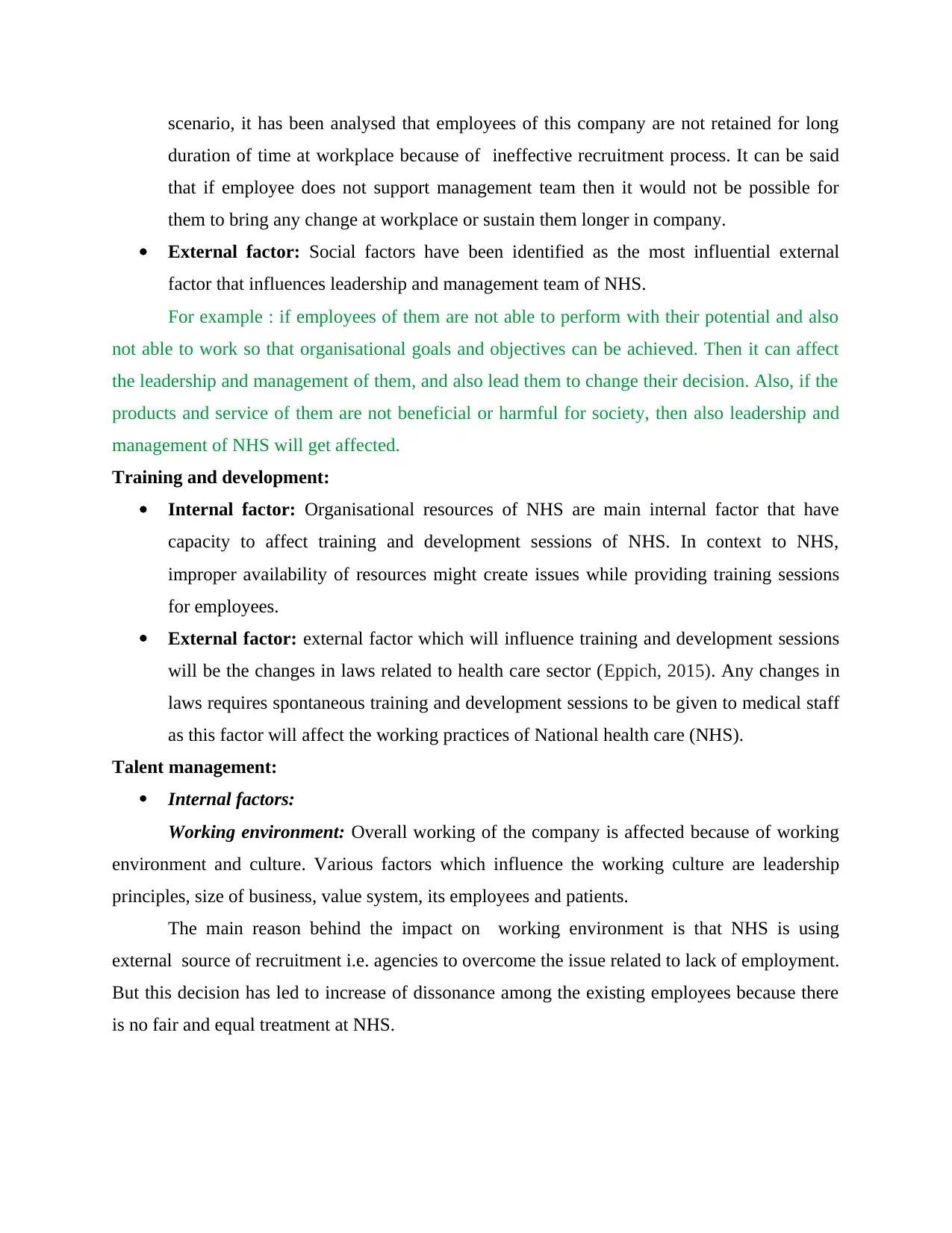
scenario, it has been analysed that employees of this company are not retained for long
duration of time at workplace because of ineffective recruitment process. It can be said
that if employee does not support management team then it would not be possible for
them to bring any change at workplace or sustain them longer in company.
External factor: Social factors have been identified as the most influential external
factor that influences leadership and management team of NHS.
For example : if employees of them are not able to perform with their potential and also
not able to work so that organisational goals and objectives can be achieved. Then it can affect
the leadership and management of them, and also lead them to change their decision. Also, if the
products and service of them are not beneficial or harmful for society, then also leadership and
management of NHS will get affected.
Training and development:
Internal factor: Organisational resources of NHS are main internal factor that have
capacity to affect training and development sessions of NHS. In context to NHS,
improper availability of resources might create issues while providing training sessions
for employees.
External factor: external factor which will influence training and development sessions
will be the changes in laws related to health care sector (Eppich, 2015). Any changes in
laws requires spontaneous training and development sessions to be given to medical staff
as this factor will affect the working practices of National health care (NHS).
Talent management:
Internal factors:
Working environment: Overall working of the company is affected because of working
environment and culture. Various factors which influence the working culture are leadership
principles, size of business, value system, its employees and patients.
The main reason behind the impact on working environment is that NHS is using
external source of recruitment i.e. agencies to overcome the issue related to lack of employment.
But this decision has led to increase of dissonance among the existing employees because there
is no fair and equal treatment at NHS.
duration of time at workplace because of ineffective recruitment process. It can be said
that if employee does not support management team then it would not be possible for
them to bring any change at workplace or sustain them longer in company.
External factor: Social factors have been identified as the most influential external
factor that influences leadership and management team of NHS.
For example : if employees of them are not able to perform with their potential and also
not able to work so that organisational goals and objectives can be achieved. Then it can affect
the leadership and management of them, and also lead them to change their decision. Also, if the
products and service of them are not beneficial or harmful for society, then also leadership and
management of NHS will get affected.
Training and development:
Internal factor: Organisational resources of NHS are main internal factor that have
capacity to affect training and development sessions of NHS. In context to NHS,
improper availability of resources might create issues while providing training sessions
for employees.
External factor: external factor which will influence training and development sessions
will be the changes in laws related to health care sector (Eppich, 2015). Any changes in
laws requires spontaneous training and development sessions to be given to medical staff
as this factor will affect the working practices of National health care (NHS).
Talent management:
Internal factors:
Working environment: Overall working of the company is affected because of working
environment and culture. Various factors which influence the working culture are leadership
principles, size of business, value system, its employees and patients.
The main reason behind the impact on working environment is that NHS is using
external source of recruitment i.e. agencies to overcome the issue related to lack of employment.
But this decision has led to increase of dissonance among the existing employees because there
is no fair and equal treatment at NHS.
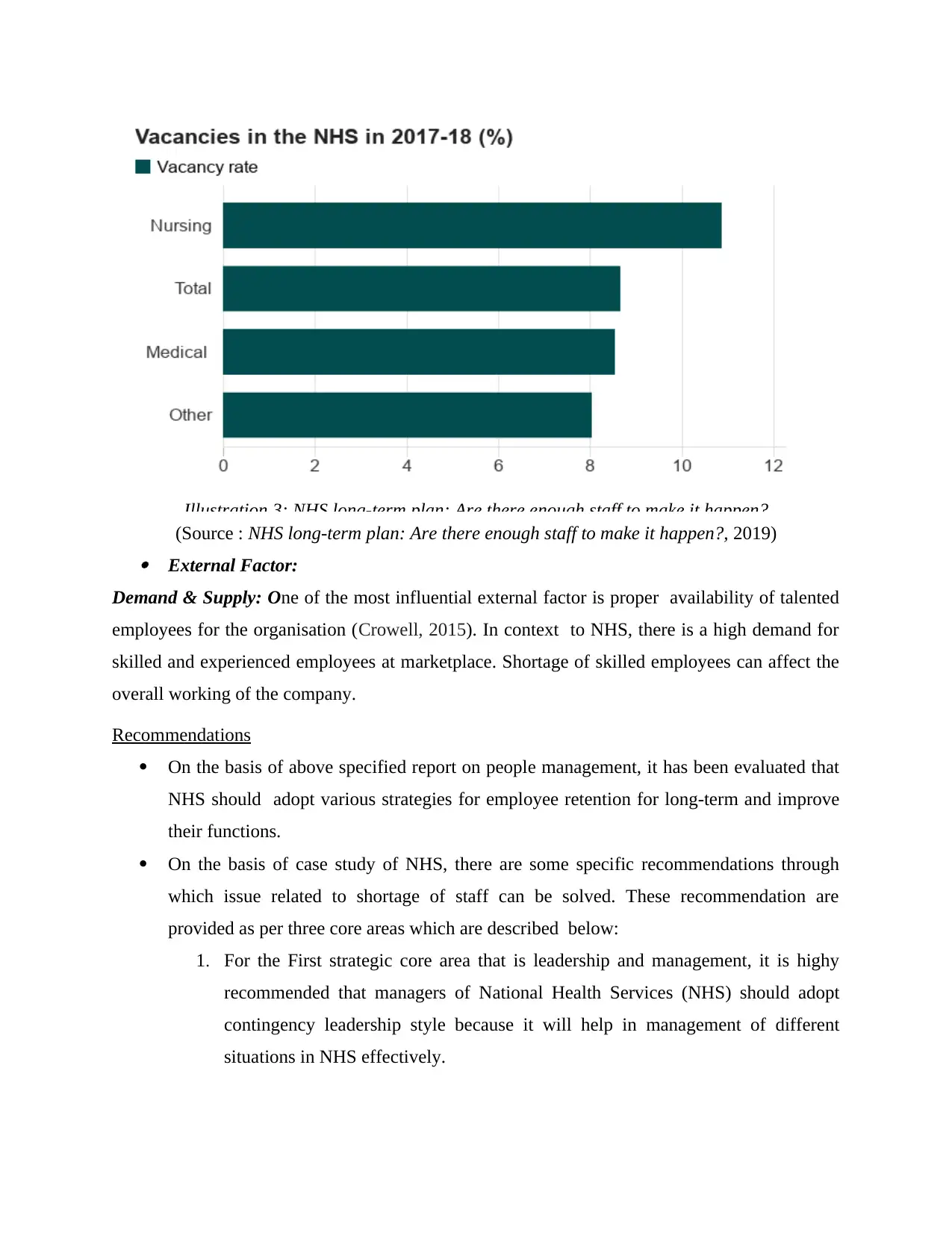
(Source : NHS long-term plan: Are there enough staff to make it happen?, 2019) External Factor:
Demand & Supply: One of the most influential external factor is proper availability of talented
employees for the organisation (Crowell, 2015). In context to NHS, there is a high demand for
skilled and experienced employees at marketplace. Shortage of skilled employees can affect the
overall working of the company.
Recommendations
On the basis of above specified report on people management, it has been evaluated that
NHS should adopt various strategies for employee retention for long-term and improve
their functions.
On the basis of case study of NHS, there are some specific recommendations through
which issue related to shortage of staff can be solved. These recommendation are
provided as per three core areas which are described below:
1. For the First strategic core area that is leadership and management, it is highy
recommended that managers of National Health Services (NHS) should adopt
contingency leadership style because it will help in management of different
situations in NHS effectively.
Illustration 3: NHS long-term plan: Are there enough staff to make it happen?
Demand & Supply: One of the most influential external factor is proper availability of talented
employees for the organisation (Crowell, 2015). In context to NHS, there is a high demand for
skilled and experienced employees at marketplace. Shortage of skilled employees can affect the
overall working of the company.
Recommendations
On the basis of above specified report on people management, it has been evaluated that
NHS should adopt various strategies for employee retention for long-term and improve
their functions.
On the basis of case study of NHS, there are some specific recommendations through
which issue related to shortage of staff can be solved. These recommendation are
provided as per three core areas which are described below:
1. For the First strategic core area that is leadership and management, it is highy
recommended that managers of National Health Services (NHS) should adopt
contingency leadership style because it will help in management of different
situations in NHS effectively.
Illustration 3: NHS long-term plan: Are there enough staff to make it happen?
⊘ This is a preview!⊘
Do you want full access?
Subscribe today to unlock all pages.

Trusted by 1+ million students worldwide
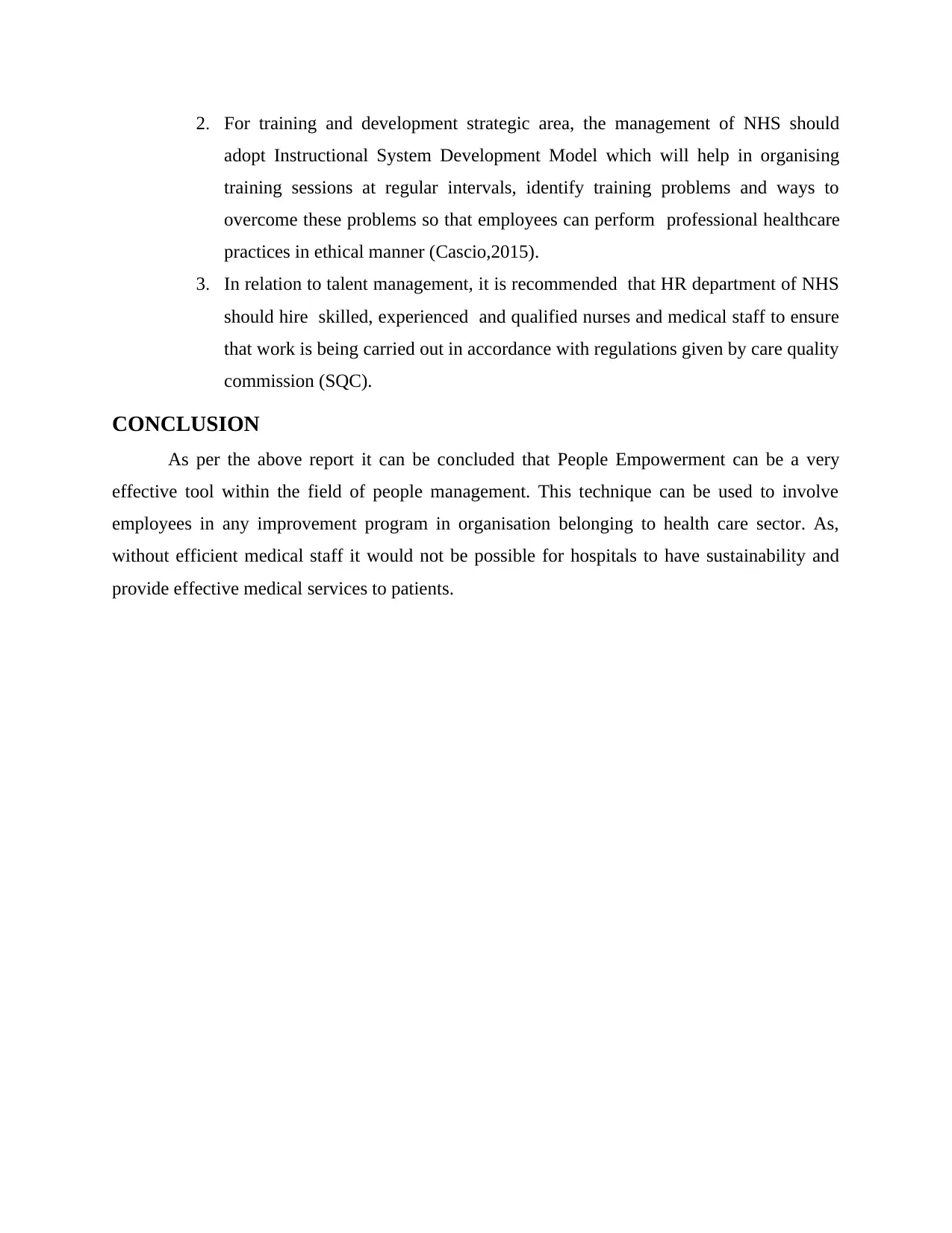
2. For training and development strategic area, the management of NHS should
adopt Instructional System Development Model which will help in organising
training sessions at regular intervals, identify training problems and ways to
overcome these problems so that employees can perform professional healthcare
practices in ethical manner (Cascio,2015).
3. In relation to talent management, it is recommended that HR department of NHS
should hire skilled, experienced and qualified nurses and medical staff to ensure
that work is being carried out in accordance with regulations given by care quality
commission (SQC).
CONCLUSION
As per the above report it can be concluded that People Empowerment can be a very
effective tool within the field of people management. This technique can be used to involve
employees in any improvement program in organisation belonging to health care sector. As,
without efficient medical staff it would not be possible for hospitals to have sustainability and
provide effective medical services to patients.
adopt Instructional System Development Model which will help in organising
training sessions at regular intervals, identify training problems and ways to
overcome these problems so that employees can perform professional healthcare
practices in ethical manner (Cascio,2015).
3. In relation to talent management, it is recommended that HR department of NHS
should hire skilled, experienced and qualified nurses and medical staff to ensure
that work is being carried out in accordance with regulations given by care quality
commission (SQC).
CONCLUSION
As per the above report it can be concluded that People Empowerment can be a very
effective tool within the field of people management. This technique can be used to involve
employees in any improvement program in organisation belonging to health care sector. As,
without efficient medical staff it would not be possible for hospitals to have sustainability and
provide effective medical services to patients.
Paraphrase This Document
Need a fresh take? Get an instant paraphrase of this document with our AI Paraphraser
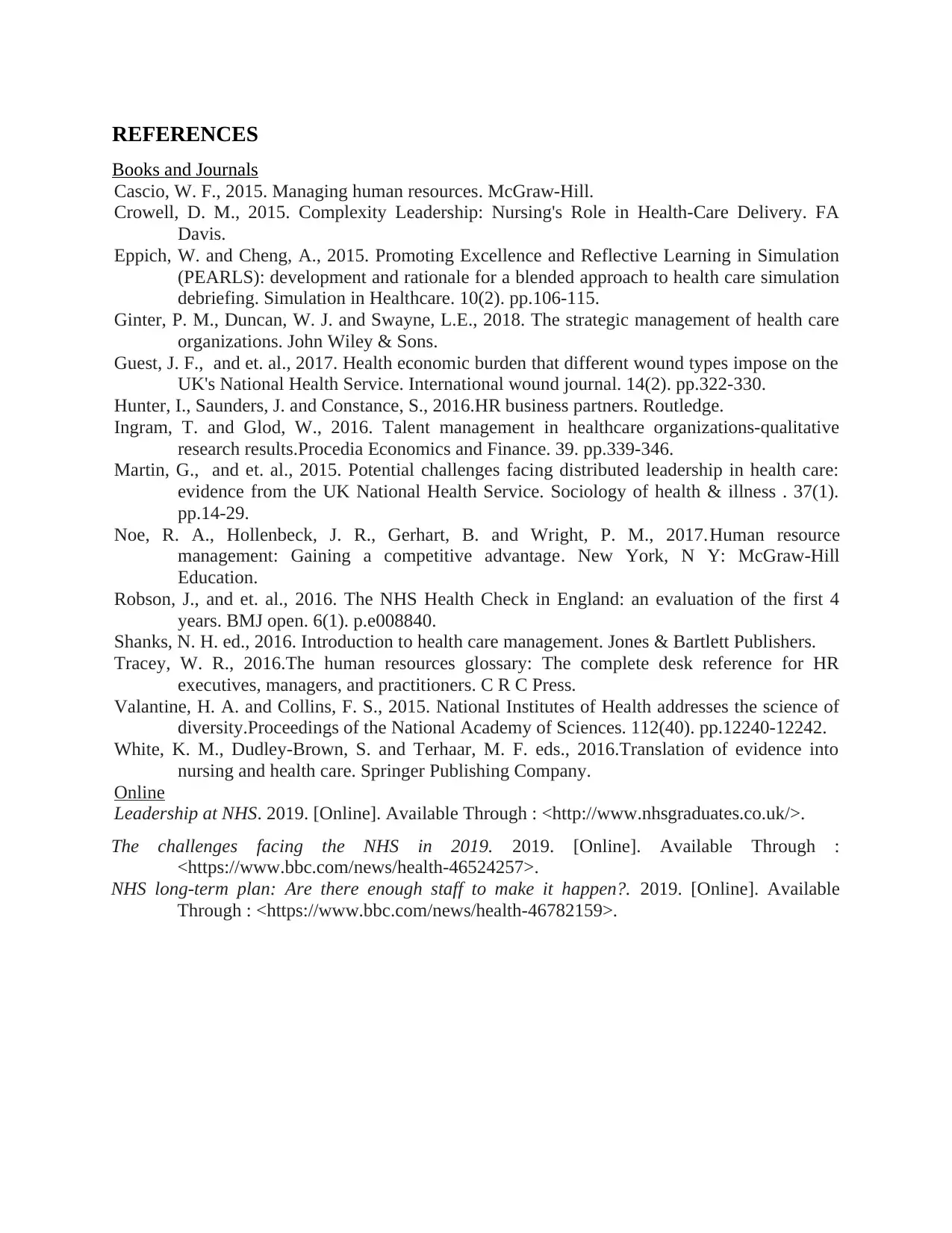
REFERENCES
Books and Journals
Cascio, W. F., 2015. Managing human resources. McGraw-Hill.
Crowell, D. M., 2015. Complexity Leadership: Nursing's Role in Health-Care Delivery. FA
Davis.
Eppich, W. and Cheng, A., 2015. Promoting Excellence and Reflective Learning in Simulation
(PEARLS): development and rationale for a blended approach to health care simulation
debriefing. Simulation in Healthcare. 10(2). pp.106-115.
Ginter, P. M., Duncan, W. J. and Swayne, L.E., 2018. The strategic management of health care
organizations. John Wiley & Sons.
Guest, J. F., and et. al., 2017. Health economic burden that different wound types impose on the
UK's National Health Service. International wound journal. 14(2). pp.322-330.
Hunter, I., Saunders, J. and Constance, S., 2016.HR business partners. Routledge.
Ingram, T. and Glod, W., 2016. Talent management in healthcare organizations-qualitative
research results.Procedia Economics and Finance. 39. pp.339-346.
Martin, G., and et. al., 2015. Potential challenges facing distributed leadership in health care:
evidence from the UK National Health Service. Sociology of health & illness . 37(1).
pp.14-29.
Noe, R. A., Hollenbeck, J. R., Gerhart, B. and Wright, P. M., 2017.Human resource
management: Gaining a competitive advantage. New York, N Y: McGraw-Hill
Education.
Robson, J., and et. al., 2016. The NHS Health Check in England: an evaluation of the first 4
years. BMJ open. 6(1). p.e008840.
Shanks, N. H. ed., 2016. Introduction to health care management. Jones & Bartlett Publishers.
Tracey, W. R., 2016.The human resources glossary: The complete desk reference for HR
executives, managers, and practitioners. C R C Press.
Valantine, H. A. and Collins, F. S., 2015. National Institutes of Health addresses the science of
diversity.Proceedings of the National Academy of Sciences. 112(40). pp.12240-12242.
White, K. M., Dudley-Brown, S. and Terhaar, M. F. eds., 2016.Translation of evidence into
nursing and health care. Springer Publishing Company.
Online
Leadership at NHS. 2019. [Online]. Available Through : <http://www.nhsgraduates.co.uk/>.
The challenges facing the NHS in 2019. 2019. [Online]. Available Through :
<https://www.bbc.com/news/health-46524257>.
NHS long-term plan: Are there enough staff to make it happen?. 2019. [Online]. Available
Through : <https://www.bbc.com/news/health-46782159>.
Books and Journals
Cascio, W. F., 2015. Managing human resources. McGraw-Hill.
Crowell, D. M., 2015. Complexity Leadership: Nursing's Role in Health-Care Delivery. FA
Davis.
Eppich, W. and Cheng, A., 2015. Promoting Excellence and Reflective Learning in Simulation
(PEARLS): development and rationale for a blended approach to health care simulation
debriefing. Simulation in Healthcare. 10(2). pp.106-115.
Ginter, P. M., Duncan, W. J. and Swayne, L.E., 2018. The strategic management of health care
organizations. John Wiley & Sons.
Guest, J. F., and et. al., 2017. Health economic burden that different wound types impose on the
UK's National Health Service. International wound journal. 14(2). pp.322-330.
Hunter, I., Saunders, J. and Constance, S., 2016.HR business partners. Routledge.
Ingram, T. and Glod, W., 2016. Talent management in healthcare organizations-qualitative
research results.Procedia Economics and Finance. 39. pp.339-346.
Martin, G., and et. al., 2015. Potential challenges facing distributed leadership in health care:
evidence from the UK National Health Service. Sociology of health & illness . 37(1).
pp.14-29.
Noe, R. A., Hollenbeck, J. R., Gerhart, B. and Wright, P. M., 2017.Human resource
management: Gaining a competitive advantage. New York, N Y: McGraw-Hill
Education.
Robson, J., and et. al., 2016. The NHS Health Check in England: an evaluation of the first 4
years. BMJ open. 6(1). p.e008840.
Shanks, N. H. ed., 2016. Introduction to health care management. Jones & Bartlett Publishers.
Tracey, W. R., 2016.The human resources glossary: The complete desk reference for HR
executives, managers, and practitioners. C R C Press.
Valantine, H. A. and Collins, F. S., 2015. National Institutes of Health addresses the science of
diversity.Proceedings of the National Academy of Sciences. 112(40). pp.12240-12242.
White, K. M., Dudley-Brown, S. and Terhaar, M. F. eds., 2016.Translation of evidence into
nursing and health care. Springer Publishing Company.
Online
Leadership at NHS. 2019. [Online]. Available Through : <http://www.nhsgraduates.co.uk/>.
The challenges facing the NHS in 2019. 2019. [Online]. Available Through :
<https://www.bbc.com/news/health-46524257>.
NHS long-term plan: Are there enough staff to make it happen?. 2019. [Online]. Available
Through : <https://www.bbc.com/news/health-46782159>.
1 out of 11
Related Documents
Your All-in-One AI-Powered Toolkit for Academic Success.
+13062052269
info@desklib.com
Available 24*7 on WhatsApp / Email
![[object Object]](/_next/static/media/star-bottom.7253800d.svg)
Unlock your academic potential
Copyright © 2020–2026 A2Z Services. All Rights Reserved. Developed and managed by ZUCOL.





